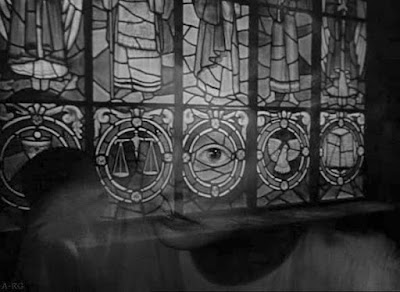May 4, 1941 [Citizen Kane]
 I went back a second time to see Citizen Kane to make sure I wasn't kidding myself. During the rich man's "picnic" scene in the antediluvian Everglades, Kane and his wife Susan are viciously arguing in their tent. He rises, furious that she knows his generosity comes with a price—"you gotta love him"—and he strikes her. A woman outside screams—laughing? terror-stricken? I can't tell; Boy Wonder Welles has made a movie so complete it seems to turn its back on us, as though our attention were not as important as its own assertions. But Susan doesn't retreat; she stares up at him, through him, as though he were already dead—and the scene dissolves to Kane's ever-winding mansion and a stained-glass window, on which is an eye that exactly replaces Susan's own, her defiance bearing down on Kane, following him into his cold Xanadu.
I went back a second time to see Citizen Kane to make sure I wasn't kidding myself. During the rich man's "picnic" scene in the antediluvian Everglades, Kane and his wife Susan are viciously arguing in their tent. He rises, furious that she knows his generosity comes with a price—"you gotta love him"—and he strikes her. A woman outside screams—laughing? terror-stricken? I can't tell; Boy Wonder Welles has made a movie so complete it seems to turn its back on us, as though our attention were not as important as its own assertions. But Susan doesn't retreat; she stares up at him, through him, as though he were already dead—and the scene dissolves to Kane's ever-winding mansion and a stained-glass window, on which is an eye that exactly replaces Susan's own, her defiance bearing down on Kane, following him into his cold Xanadu. So I wasn't seeing things after all—better yet, I was: It's an obsessively precise magic trick that tells us much about her gaze laying its claim on his empty power over—well, nothing; and about the end of things for him, which he sees clearly, trapped by his own losses. But it's so fleeting, so incidental, that I was taken aback. What did they have to go through, Welles and his crew, for those two eyes to melt into one another? How many hours on the sets, in the editing room? Who got hollered at because it wasn't working out—and why do it in the first place? In this and countless other moments in the picture, Welles becomes Kane, building a Creature—"love on his own terms"—that from now on will follow me into the movies, tugging at my sleeve, grinning at my weary acquiescence to its voice booming in every theater I'll ever sit in: "I'm Charles Foster Kane!"


I'm to return to it second time...it's transfixed in the mind all right...the strangest part is that a guy of 25 could have this integrated view of life, including decline and age...many images embedded in the psyche....the No Trespassing...Rosebud turns to embers....the camera descends on the drunk Susan(?)...
ReplyDelete